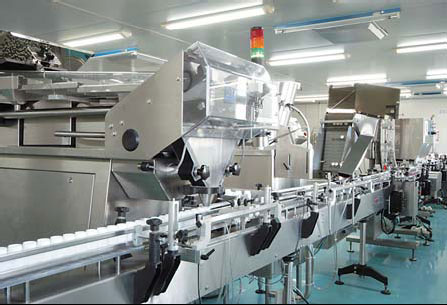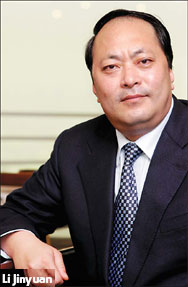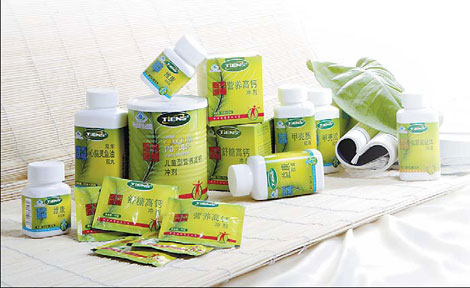


Li Jinyuan is a tough-minded boss. In his dictionary, there is no word such as "impossible" or "giving up".
"I have never thought about abandoning my business dream, although I have experienced numerous twists and turns on the path of doing business," says Li, chairman of Tiens Group.
Li's difficulties included the shortage of floating capital, policy restrictions, white-hot competition, rising labor and energy costs.
Tianjin-based Tiens Group, focusing on healthcare products and consumer products, has grown into a global enterprise with business operations in more than 190 countries and regions and a customer pool of over 10 million.
Despite his company's success, Li says there were times when he even thought about committing suicide in the face of some seemingly insurmountable obstacles.
"I finally chose to hold on, not because of myself, but because of my employees following me. I cannot afford to let thousands of people down," Li stresses.
Meaning a "heavenly lion" in Chinese, Tiens is now going global with Li at the helm.
Li first started Tiens in 1995 with its core business concentrating on advanced biotech industry and healthcare products.
Tiens Group began producing calcium supplements after it was founded at the Wuqing Development Zone in Tianjin municipality in 1995.

Now the group manufactures health products for dozens of diseases and health problems, including arthritis, osteoporosis, cancer, allergies, anemia, diabetes, thyroid problems, gout, headaches, stress, obesity, skin problems, high blood pressure, high cholesterol, stroke, asthma, bronchitis, pneumonia, sinusitis, constipation, diarrhoeadiarrhea, liver-gall bladder problems, kidney problems, pre-menstrual syndrome, low libido, prostate and infertility problems.
"From that year (1995) on, we adopted the revolutionized sales pattern of direct marketing, which helped crack the hard nut of triangular debt (three-party). I believe the business model suits China well," Li says.
But it wasn't easy to turn the theory into practice, and Li encountered countless difficulties and obstacles promoting Tiens' sales volume.
At a most difficult time, Li sold his Mercedes Benz sedan and several of his factories in other cities in order to pay employee salaries and to support Tiens.
"There were so many tragic and unbearable things occurring at that time. I really dare not recall them. So don't push me too hard," Li says, in a joking tone.
The group marched into the international arena in early 1998, with an internationalized paradigm geared to its self-development. So far, there are 50,000 franchised outlets around the world selling its products, and the group has set up branches in about 110 countries and regions.
"Now we own a global sales network and we are familiar and comply with rules and standards in 110-odd countries and regions. That is one of our big comparative advantages," Li contends.
Tiens group has successfully developed more than 1,000 products, which are based on advanced biotechnologies, in-depth research of Chinese traditional medicine and the Chinese philosophy of healthcare.
R&D center
Tianjin, as a future economic center and a nascent north China growth engine, serves as a manufacturing hub, as well as a potential consumer market for Tiens.
To feed Tiens' sales outlets, Li is planning and building a new research and development (R&D) and production complex in Wuqing District of Tianjin as an integrated industrial park combining R&D, production, conference center, a hotel and recreation area.
"It will be our R&D and production hub. Once completed, it will also be a place to host guests and clients from our 190-odd markets all over the world, for business and leisure," Li says.
The project will involve an investment as large as 7 billion yuan, with a construction space of around 800,000 sq m.
There will be an international banquet hall and conference center to accommodate 3,000 and 7,000 people respectively.
"Once completed, the park will contribute 3 billion yuan of tax every year," Li stresses.
Tianjin hopes to turn itself into a new growth engine similar to Shenzhen and Shanghai Pudong. Li is confident that with a R&D and production base located in Tianjin, his "heavenly lion" will fly higher on the global stage.
Global partners
To avoid extra expenses and risks such as tariffs, anti-dumping charges, foreign exchange costs and transportation costs, Tiens established an unique business pattern to partner with overseas original equipment manufacturers (OEM) and original design manufacturers (ODM) to maintain local production abroad.
Multinationals have hammered out long-term partnerships with Tiens, serving as high-end OEM and ODM for Tiens.
It is not cheap to find partners at that level. However, by cooperating with them Tiens can guarantee the quality of its products and enhance its brand value.
"Also by doing this, increased foreign exchange costs and other extra costs will be fended off," Li explains.
In return, Tien's OEM and ODM suppliers can benefit from such partnerships because of the company's extensive global sales networks and its large customer pool.
"We can have our brand power boosted, while our partners can sell products they made through our business channels. It's a win-win situation," Li emphasizes.
Tiens adopted the strategy of finding high-end global OEM and ODM partners beginning in 2001, when many privately owned Chinese enterprises were still enthusiastic about and satisfied with serving as OEM suppliers for multinationals.
New targets
With its core production and R&D hub in Tianjin and its global manufacturing and sales networks, Tiens is aiming high again with new targets. And Li is fully geared up for another business starting from Tianjin.
"We will once again classify our international markets, and fully tap the potential of the emerging ones," Li says.
Emerging and promising markets, such as Africa, Southeast Asia, Russia, Eastern Europe and Latin America, will play an important role in Tiens' ambitious global expansion plan, Li adds.
The group is expected to pour in a huge investment to establish up to 1,000 direct-selling supermarkets around the world by 2009 in order to sell its flagship products and further cement its global foothold.
The actual investment for the supermarkets amounts to hundreds of millions of US dollars. Dozens of the supermarkets will be established in Africa, according to Li.
"It is a gigantic project, which will give us a competitive edge. In fact, we believe we will outpace our competitors by adopting such a business model," Li says.

(China Daily 09/22/2008 page12)













